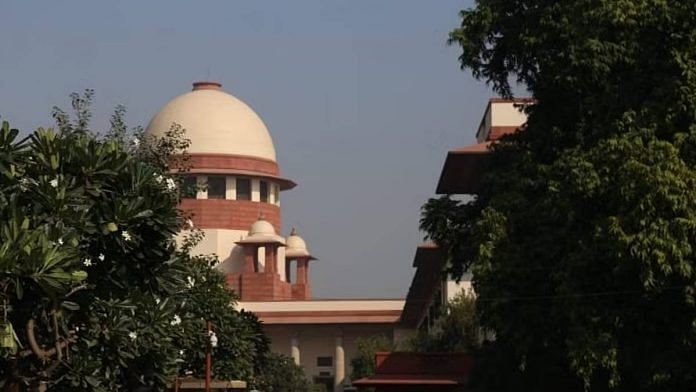New Delhi: The twin conditions on in the Prevention of Money Laundering Act (PMLA) that make the grant of bail more stringent in cases filed under the law are not a fetter preventing courts from exercising the right to bail, the Supreme Court observed Wednesday.
“Right to bail flows from Article 21 (right to liberty) of the Constitution,” a bench of Justices Sanjiv Khanna and Dipankar Datta said during the hearing of a bail petition filed by Prem Prakash, who is alleged to be an aide of former Jharkhand Chief Minister Hemant Soren and is in jail in connection with an illegal mining case.
The judges also took strong objection to the Enforcement Directorate’s (ED) practice of filing a supplementary chargesheet, to show that its probe is still on, with the intention to deny default bail to accused arrested under the PMLA.
This practice, they said, was bothering the court because due to the impression that investigation is still on, courts in the district judiciary were unable to start trial in the cases pending before them. “Continuing with investigation keeps the undertrial in jail indefinitely,” the bench said.
A person arrested for a criminal case is entitled to default bail in case the investigating agency is unable to complete the probe and file a chargesheet or final probe report in court within the stipulated timeline, as laid down in the Code of Criminal Procedure.
According to Section 167(2) of the code, an accused can be detained for a maximum of 90 days for a crime punishable with death, life imprisonment or a sentence of over 10 years. If the investigation relates to any other offence, the accused can be detained for 60 days.
If the investigative agencies do not complete their probe within the deadline specified in the code, the arrested person is entitled to “default bail”. However, lately, in many ED cases it has been noticed that the agency has opposed grant of bail to accused facing proceedings under the PMLA on the ground that the agency’s probe is still on, and by filing of supplementary chargesheet.
Commenting on this practice, Justice Khanna told the ED’s counsel, additional solicitor general S.V. Raju, that the whole object of default bail is that the agency does not arrest the accused until investigation is complete.
“You cannot say a trial will not commence unless investigation is complete. You cannot keep on filing supplementary chargesheet and the person (remains) in jail without trial,” the judge added.
Prakash, the court pointed out, has been in jail for 18 months. “This is bothering us,” it said, warning that the court might put the ED to notice on the matter. “Trial has to begin when you arrest an accused,” the bench emphasised.
Raju was told that Prakash’s case was a “clear case of bail”.
Also Read: EC appointments: SC says it’s a ‘myth’ court can’t make law, no strict separation of powers in India
‘Interesting questions of law’
The ED has accused Prakash of acquiring proceeds of crime through illegal mining and transportation of stone chips. He is alleged to have laundered cash as well as funds received through banking channels. According to the ED, he used the money for his personal gain.
Prakash moved the top court after the Jharkhand High Court denied him bail in January 2023.
On Wednesday, Raju opposed bail to Prakash and submitted that the case gave rise to “interesting questions of law” and that he was accused of “evidence tampering”.
To these two contentions, the bench said “interesting questions of law” did not require him to be in jail and as far as evidence tampering was concerned, it added, the ED can always come back to the court in case Prakash was found to be involved in such act.
When the court was reminded of Section 45 of the PMLA, which lays down the rigorous twin conditions for bail, the bench quipped that the provision does not take away the right to be released on bail, which an accused is entitled to under Article 21.
Justice Khanna recalled his observations in the order that denied bail to AAP leader Manish Sisodia, who is in jail in the Delhi excise policy case, that in case of undue incarceration, the court can release the person on bail.
The court adjourned the hearing to 29 April, while asking the ED to respond to the legal issues arising in the matter of default bail.
In another PMLA case, the same bench Wednesday released Hyderabad-based businessman Abhishek Boinpally, accused in the excise policy case involving Sisodia. Boinpally was denied bail in July 2023 by the Delhi High Court.
The court said that Boinpally will be released for four weeks on interim bail on the terms and conditions to be fixed by the trial court. It will, however, hear the matter again on 29 April along with Prakash’s case. The bench observed that since common questions of law arise in both cases, it would prefer to hear them together.
Boinpally is a former director of Robin Distilleries. Arrested by the Central Bureau of Investigation (CBI) in October 2022, the ED took him into custody after a CBI court in Delhi granted him bail a month later.
(Edited by Nida Fatima Siddiqui)
Also Read: ‘Lack of understanding’, say ex-chief election commissioners after SC flags their short tenures




Thoughts go to the Bhima Koregaon case. There is a need for the honourable apex court to comprehensively review the jurisprudence relating to grant of bail in cases related to UAPA and PMLA. Issue guidelines for trial courts, which often feel diffident. 2. For a lay person, the metric should be whether the individual is a flight risk, or can influence witnesses, tamper with the records.